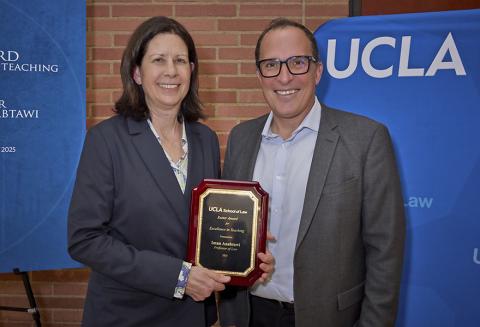Iman Anabtawi wins the Rutter Award for Excellence in Teaching

UCLA School of Law faculty and staff members, students, alumni, and friends gathered on April 23 to celebrate Professor Iman Anabtawi, who earned the 2025 Rutter Award for Excellence in Teaching. It is the law school’s highest honor for distinguished work in the classroom.
The event included speeches that emphasized Anabtawi’s exceptional warmth, commitment, and relationships with generations of law students.
“She is really an outstanding member of our faculty, someone who has been a wonderful mentor to dozens and dozens of students over the years, and a great colleague to so many of us,” said Michael Waterstone, the dean of UCLA Law. “She’s brilliant, she’s kind, she’s generous, dedicated, thoughtful, and amongst the best representatives our school and our drive to serve the community and teach law at the highest level.”
An authority in mergers and acquisitions, Anabtawi joined the law school’s faculty in 2000 and has taught an array of business law classes, including, notably, in the law school’s experiential and Master of Legal Studies (M.L.S.) programs. Her mainstay Merger and Acquisition Transactions simulation course is among the law school’s most popular, delivering, for a quarter century, practical legal skills in an unconventional and dynamic setting. And as an inaugural member of the M.L.S. faculty, she helped design the program’s inventive curriculum for mid-career professionals who want to gain a deep education in the law without becoming lawyers.
A “hallmark of our community is how we emphasize innovation and a drive to expand the meaning and reach of legal education, and in this way, you have really been a true leader in teaching and moving things forward,” Waterstone said. “You always give something extra, whether it’s a new way of looking at old laws or old methods of legal training – or be it the ways you make connections and, in turn, create inspiration.”
Anabtawi is also the author, with her UCLA Law colleague Professor Stephen Bainbridge, of Mergers and Acquisitions: A Transactional Perspective (Foundation Press, second edition, 2023). Before entering academia, she was an attorney at O’Melveny & Myers and a law clerk for Justice Sandra Day O’Connor on the U.S. Supreme Court, among other leading positions.
She is the 48th member of the UCLA Law faculty to win the Rutter Award, which was founded in 1979 by renowned legal publisher William Rutter and is presented each year to teachers at five top California law schools. At the event, Anabtawi delivered a lecture before an audience that included many of her colleagues and current and former students, as well as her husband, Ed, and daughter, Lara. Other speakers included Rutter’s son UCLA Law alumnus Paul Rutter ’78, a member of the law school’s board of advisors and real estate lawyer at Cozen O’Connor.
“The Rutter Award reaffirms annually that being effective educators lies at the core of our mission as a law school,” Anabtawi said.
Anabtawi devoted a significant amount of her speech to championing the benefits of skills-based training in law school and the importance of how experiential courses such as her M&A Transactions simulation class “smooth the transition from law school to law practice and serve as a capstone of [students’] legal education.”
“Teaching experientially,” she said, “has been a capstone for me, as well. It has allowed me to bring together my many years of practice experience and my academic study of business law. In its best moments, it has felt simultaneously empowering and rigorous for the students, and it has given me confidence that while A.I. may automate many legal tasks, we are equipping our students for the future by cultivating in them their uniquely human attributes of nuanced ethical judgment, empathetic client understanding, and contextual interpretation of complex legal scenarios.”
She drew a parallel between the collaborative environment that she fosters in the classroom with her experience working for Justice O’Connor at the Supreme Court. Law professors excel when they seek out and use new and different educational methods, she said, and she credited many UCLA programs for presenting her with the tools to grow professionally in the classroom, including a recent workshop on inclusive teaching.
“We discussed strategies for making a class into a community, with common educational purpose. Our conversation resonated with my own experience as a law student,” she said.
“In an environment where students trust both their professor and each other to focus not on whether an answer is right or wrong, or on who gave it, but rather on how the answer can help move forward the collaborative process of working on a difficult problem, students are far more willing to take the risks required of them to become co-venturers in the learning process.”
-
Master of Legal Studies